Taliban seizes cities as Afghan military collapses
More than 1,000 soldiers flee across border as others hand over weapons to insurgents
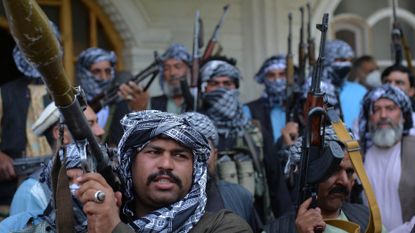
- 1. I fought in Afghanistan. I still wonder, was it worth it?
- 2. Forgiveness should also extend to the living
- 3. Why exactly do you think BLM founder Patrisse Cullors shouldn’t live in a million-dollar house?
- 4. Vaccines are the answer to this crisis. Why won't the Government admit it?
- 5. A battle for green supremacy between the US and China could help save the planet
1. I fought in Afghanistan. I still wonder, was it worth it?
Timothy Kudo in The New York Times
on withdrawing from Afghan
Timothy Kudo, a former Marine captain who served in the Afghanistan war, recalls a letter he wrote on the eve of his deployment in case he was killed. “The first paragraph reads, ‘It was worth it’, then it continues about honor, duty and patriotism before closing with a final farewell and a request for burial at Arlington,” he writes in The New York Times. “‘It was worth it’. The words reverberate. The weight feels a little heavier, and I whisper them like a mantra and continue marching. But now the war is ending, and those words are enigmatic.” As the US pulls its troops out of Afghanistan, Kudo fears that “the most meaningful part of my life – and only its prologue – is being erased by time, by the enemy and even by my country”. He wonders: “Was it worth it? Everything has been because I’d been able to answer yes to that question. But what if the answer is no?”
Subscribe to The Week
Escape your echo chamber. Get the facts behind the news, plus analysis from multiple perspectives.

Sign up for The Week's Free Newsletters
From our morning news briefing to a weekly Good News Newsletter, get the best of The Week delivered directly to your inbox.
From our morning news briefing to a weekly Good News Newsletter, get the best of The Week delivered directly to your inbox.
2. Forgiveness should also extend to the living
Jemima Kelly in the Financial Times
on celebrating the living
The late Prince Philip and American rapper DMX have this week been “more celebrated for what they achieved than chastised for what they got wrong”, but “back in the land of the living, it’s a different affair entirely”, says Jemima Kelly in the Financial Times. Whether or not you believe cancel culture exists, we live “in world of moral absolutism and censoriousness, at least online”, argues Kelly. “In the end, humans are complicated, messy and hypocritical beings, who contain bad bits as well as good bits. We would all be happier, it seems to me, if we learnt to accept – even to celebrate – one another before we reach the grave. It seems a shame to reserve redemption for the dead.”
Sign up for Today's Best Articles in your inbox
A free daily email with the biggest news stories of the day – and the best features from TheWeek.com
3. Why exactly do you think BLM founder Patrisse Cullors shouldn’t live in a million-dollar house?
Christabel Nsiah-Buadi on The Independent
on black wealth
The vilification of Patrisse Cullors, the co-founder of Black Lives Matter, for buying a million-dollar house in an affluent neighbourhood “speaks volumes about what we think Black people should fight for, and what Black people should have access to”, says Christabel Nsiah-Buadi on The Independent. “There is no reason why a person can’t have personal luxuries while running profitable businesses and also advocating for racial justice.” Nsiah-Buadi concludes: “Black people have been continually shut out of places where they might be able to generate their own wealth over the past hundred years, and that means that demanding they prove their virtuousness by staying poor is completely absurd.”
4. Vaccines are the answer to this crisis. Why won't the Government admit it?
Ross Clark in The Daily Telegraph
on underestimating vaccines
“Ministers seem determined to pooh-pooh their one great success while throwing huge sums at the things which haven’t worked well,” says Ross Clark in The Daily Telegraph. He takes aim at Boris Johnson’s “bizarre” insistence that lockdown is the main reason for the drop in coronavirus cases and deaths rather than vaccinations, which contradicts a study out today. “The Prime Minister acts as if he doesn’t trust the data on vaccines, and as if he believes that you can’t inoculate your way out of a pandemic – in spite of the world having successfully suppressed all manner of infectious diseases by such means,” says Clark. Persuading young people to get vaccinated was never going to be straightforward, but “the government has made it a lot harder than it needs to be”.
5. A battle for green supremacy between the US and China could help save the planet
Tom Cheshire on Sky News
President Joe Biden’s climate envoy, John Kerry, is in Shanghai today to discuss climate change – “the biggest challenge the world faces” – with Chinese leaders. But “perhaps China and the US don't need to agree on much, or take part in any horse trading”, says Tom Cheshire on Sky News. “Instead, each country could seek to do more than the other on climate change – in the same way as they are, very publicly, competing diplomatically and economically.” Cheshire concludes: “Cooperation has its uses. But if the two preeminent powers in the world start competing to save the planet, that could be even more useful.”
Create an account with the same email registered to your subscription to unlock access.
Joe Evans is the world news editor at TheWeek.co.uk. He joined the team in 2019 and held roles including deputy news editor and acting news editor before moving into his current position in early 2021. He is a regular panellist on The Week Unwrapped podcast, discussing politics and foreign affairs.
Before joining The Week, he worked as a freelance journalist covering the UK and Ireland for German newspapers and magazines. A series of features on Brexit and the Irish border got him nominated for the Hostwriter Prize in 2019. Prior to settling down in London, he lived and worked in Cambodia, where he ran communications for a non-governmental organisation and worked as a journalist covering Southeast Asia. He has a master’s degree in journalism from City, University of London, and before that studied English Literature at the University of Manchester.
-
 'Make legal immigration a more plausible option'
'Make legal immigration a more plausible option'Instant Opinion Opinion, comment and editorials of the day
By Harold Maass, The Week US Published
-
 LA-to-Las Vegas high-speed rail line breaks ground
LA-to-Las Vegas high-speed rail line breaks groundSpeed Read The railway will be ready as soon as 2028
By Peter Weber, The Week US Published
-
 Israel's military intelligence chief resigns
Israel's military intelligence chief resignsSpeed Read Maj. Gen. Aharon Haliva is the first leader to quit for failing to prevent the Hamas attack in October
By Justin Klawans, The Week US Published
-
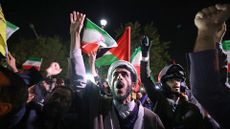 Will Iran's attack on Israel backfire?
Will Iran's attack on Israel backfire?Today's Big Question The unprecedented targeting of Israel could be a 'godsend' for Netanyahu as the limits of Tehran's military power are exposed
By Elliott Goat, The Week UK Published
-
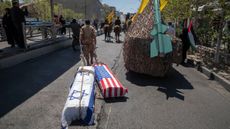 Will Iran risk all-out war with Israel?
Will Iran risk all-out war with Israel?Today's Big Question Tehran has not wanted to be directly involved in the Middle East conflict so far. But that could be about to change
By Chas Newkey-Burden, The Week UK Published
-
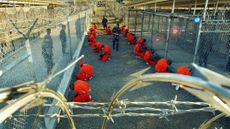 A history of Guantánamo Bay
A history of Guantánamo BayThe Explainer War of Terror's 'symbol of torture, rendition and indefinite detention' is subject of new Serial podcast series
By The Week UK Published
-
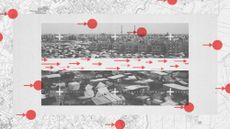 'Humanitarian islands': how will Israel's plan for Rafah civilians work?
'Humanitarian islands': how will Israel's plan for Rafah civilians work?Today's Big Question Designated zones in central Gaza to provide temporary housing, food and water for more than a million displaced Palestinians
By The Week UK Published
-
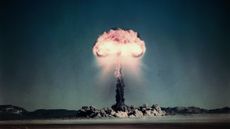 How likely is an accidental nuclear incident?
How likely is an accidental nuclear incident?The Explainer Artificial intelligence, secret enemy tests or false alarms could trigger inadvertent launch or detonation
By Chas Newkey-Burden, The Week UK Published
-
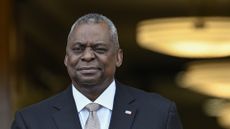 Pentagon struggles to explain Defense Secretary Lloyd Austin's secret hospitalization
Pentagon struggles to explain Defense Secretary Lloyd Austin's secret hospitalizationSpeed Read The intensely private Pentagon chief kept even President Joe Biden in the dark about his illness for 3 days
By Peter Weber, The Week US Published
-
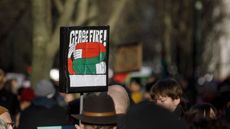 Israel-Hamas: what do both sides need in order to agree a sustainable ceasefire?
Israel-Hamas: what do both sides need in order to agree a sustainable ceasefire?Today's Big Question Israel and Hamas 'open' to renewed ceasefire and hostage release, as pressure mounts on Benjamin Netanyahu at home and abroad
By Elliott Goat, The Week UK Published
-
 Will Israeli invasion of Gaza backfire?
Will Israeli invasion of Gaza backfire?Today's big question The reality is that there are no good options for Benjamin Netanyahu
By The Week Staff Published